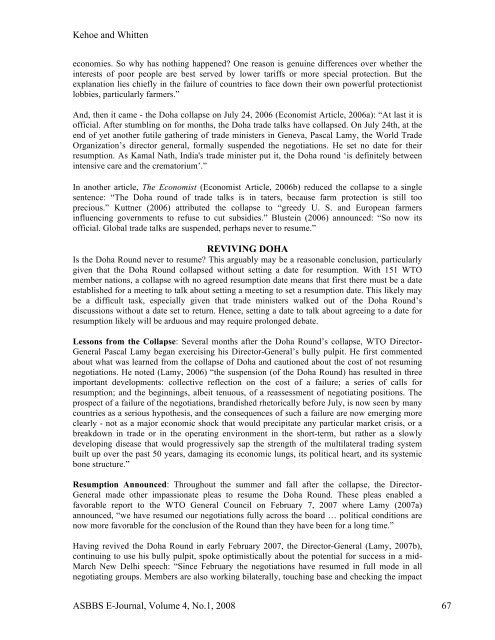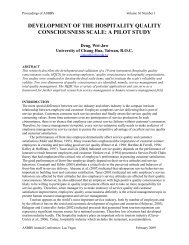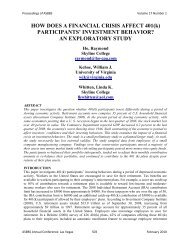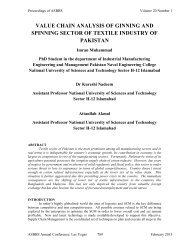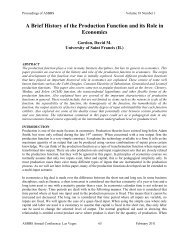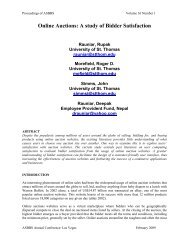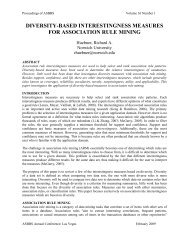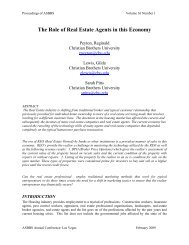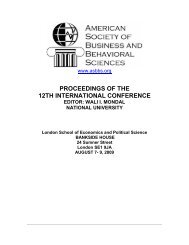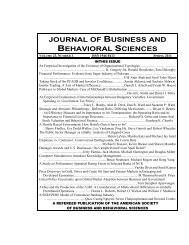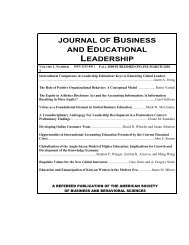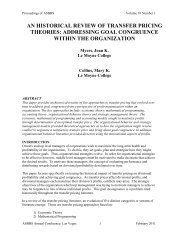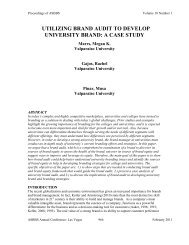stock repurchase announcements: a test of market ... - Asbbs.org
stock repurchase announcements: a test of market ... - Asbbs.org
stock repurchase announcements: a test of market ... - Asbbs.org
Create successful ePaper yourself
Turn your PDF publications into a flip-book with our unique Google optimized e-Paper software.
Kehoe and Whitten<br />
economies. So why has nothing happened? One reason is genuine differences over whether the<br />
interests <strong>of</strong> poor people are best served by lower tariffs or more special protection. But the<br />
explanation lies chiefly in the failure <strong>of</strong> countries to face down their own powerful protectionist<br />
lobbies, particularly farmers.”<br />
And, then it came - the Doha collapse on July 24, 2006 (Economist Article, 2006a): “At last it is<br />
<strong>of</strong>ficial. After stumbling on for months, the Doha trade talks have collapsed. On July 24th, at the<br />
end <strong>of</strong> yet another futile gathering <strong>of</strong> trade ministers in Geneva, Pascal Lamy, the World Trade<br />
Organization’s director general, formally suspended the negotiations. He set no date for their<br />
resumption. As Kamal Nath, India's trade minister put it, the Doha round ‘is definitely between<br />
intensive care and the crematorium’.”<br />
In another article, The Economist (Economist Article, 2006b) reduced the collapse to a single<br />
sentence: “The Doha round <strong>of</strong> trade talks is in taters, because farm protection is still too<br />
precious.” Kuttner (2006) attributed the collapse to “greedy U. S. and European farmers<br />
influencing governments to refuse to cut subsidies.” Blustein (2006) announced: “So now its<br />
<strong>of</strong>ficial. Global trade talks are suspended, perhaps never to resume.”<br />
REVIVING DOHA<br />
Is the Doha Round never to resume? This arguably may be a reasonable conclusion, particularly<br />
given that the Doha Round collapsed without setting a date for resumption. With 151 WTO<br />
member nations, a collapse with no agreed resumption date means that first there must be a date<br />
established for a meeting to talk about setting a meeting to set a resumption date. This likely may<br />
be a difficult task, especially given that trade ministers walked out <strong>of</strong> the Doha Round’s<br />
discussions without a date set to return. Hence, setting a date to talk about agreeing to a date for<br />
resumption likely will be arduous and may require prolonged debate.<br />
Lessons from the Collapse: Several months after the Doha Round’s collapse, WTO Director-<br />
General Pascal Lamy began exercising his Director-General’s bully pulpit. He first commented<br />
about what was learned from the collapse <strong>of</strong> Doha and cautioned about the cost <strong>of</strong> not resuming<br />
negotiations. He noted (Lamy, 2006) “the suspension (<strong>of</strong> the Doha Round) has resulted in three<br />
important developments: collective reflection on the cost <strong>of</strong> a failure; a series <strong>of</strong> calls for<br />
resumption; and the beginnings, albeit tenuous, <strong>of</strong> a reassessment <strong>of</strong> negotiating positions. The<br />
prospect <strong>of</strong> a failure <strong>of</strong> the negotiations, brandished rhetorically before July, is now seen by many<br />
countries as a serious hypothesis, and the consequences <strong>of</strong> such a failure are now emerging more<br />
clearly - not as a major economic shock that would precipitate any particular <strong>market</strong> crisis, or a<br />
breakdown in trade or in the operating environment in the short-term, but rather as a slowly<br />
developing disease that would progressively sap the strength <strong>of</strong> the multilateral trading system<br />
built up over the past 50 years, damaging its economic lungs, its political heart, and its systemic<br />
bone structure.”<br />
Resumption Announced: Throughout the summer and fall after the collapse, the Director-<br />
General made other impassionate pleas to resume the Doha Round. These pleas enabled a<br />
favorable report to the WTO General Council on February 7, 2007 where Lamy (2007a)<br />
announced, “we have resumed our negotiations fully across the board … political conditions are<br />
now more favorable for the conclusion <strong>of</strong> the Round than they have been for a long time.”<br />
Having revived the Doha Round in early February 2007, the Director-General (Lamy, 2007b),<br />
continuing to use his bully pulpit, spoke optimistically about the potential for success in a mid-<br />
March New Delhi speech: “Since February the negotiations have resumed in full mode in all<br />
negotiating groups. Members are also working bilaterally, touching base and checking the impact<br />
ASBBS E-Journal, Volume 4, No.1, 2008 67


